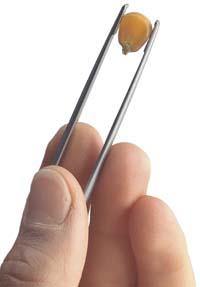GMO: science or politics?

The first thing to clarify is that MON810 refers to maize and not all GMOs. Bt corn was developed to free itself from the influence of the drilling harvest and was authorized in the European Union following the favorable report of the EFSA. This Food Security Authority is a committee of independent scientists born with the aim of drawing scientific information from political debates. France, Greece and Germany have in recent years presented "new scientific reports" on MON810, but, according to EFSA experts, new data do not show that they may be harmful to human health or the environment. The French Food Security Agency, composed of independent scientists, expressed the same opinion, although the French government did not follow its criteria.
On the other hand, according to studies published in prestigious scientific journals, Bt corn is better than conventional or ecological maize for human health. In the case of mycotoxins at risk of cancer (fumonisins), transgenics are 100 times less than the others, as demonstrated in studies conducted in France, Italy and Spain. Between 2003 and 2007, of the 62 mycotoxin alerts, none for GMOs, but for conventional and ecological ones.
In the face of all this, we wonder why if this type of maize, after conducting proven scientific reports, has been authorized to the European Union, why do some countries or regions want to restrict or prohibit on their part? Behind this recusal there are many data indicating that there are more economic reasons than scientists. Agri-food products are strategic in any society, and the novelties that are directed to this area, together with the use of some, can harm others. In the European market there are many GMOs, but they have already had a sufficient economic impact. Bt corn has a direct impact on animal and cross-sectional feed in other products that are planted (especially in the most expensive production ecologies). European legislation states that the presence of GMOs on the label should be indicated to the consumer when a product contains more than 0.9% GMOs. However, in organic farming standards, the presence of GMOs has more severe consequences. A neighbor's use of some of the pesticides marginalized by organic farming can accidentally affect the ecological harvest. In this case, if the impact does not exceed 5%, it can be put on the card that is ecological. However, if pollination were crossed to any extent with a neighborhood GM, you would have to lose the right to use the ecological card and sell the harvest at a lower price.
From a broader perspective, Germany, which produces enough maize for its needs, has allowed the prohibition of MON810 maize, but has given way to the transgenic potato Amflora, with the patent of the German company BASF. However, Spain produces 4 million tons of corn and as it has to buy 4 others abroad, Bt corn has found place in some places. Since in the Basque Country only 0.13% of these 4 million tons occur and the shortage of drilling makes the need for Bt corn not very high and wants to be banned, while in Catalonia there is 10.5%, the drilling player usually causes serious damage and his government has not seen problems with GMOs. While it is not discussed whether or not to declare transgenic-free zone, the Netherlands has drawn up an interesting proposal in the Council of European Ministers. They say that the current model has been based solely on science, on the analysis of potential risks. Without questioning the suitability of this model, they consider that a new model would be necessary to manage the economic effects they may have in the regions.
With this data, we, rather than scientists, see socio-political and economic reasons against the planting of GMOs. Therefore, we ask some questions for reflection: Is it fair to question the "safety" of GMOs to avoid economic damage? What are we going to do with other GMOs that will bring future, such as those that can be produced in droughts or those that provide special benefits to consumers? And what will happen to those who today consider this type of transgenic maize advantageous (some farmers, thinkers and ranchers, above all)? Transgenic maize produced abroad has European borders, but here we do not want to produce, is it good for farmers?
Buletina
Bidali zure helbide elektronikoa eta jaso asteroko buletina zure sarrera-ontzian








